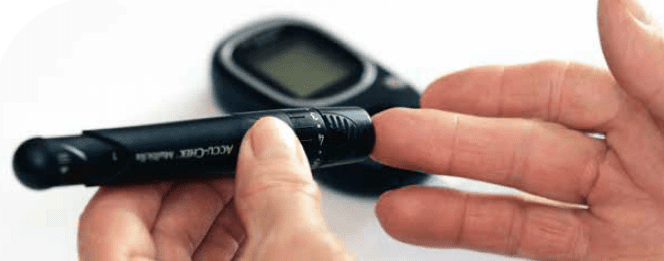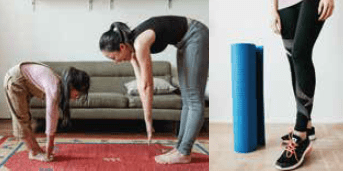
Did you know…?
The best diet for managing diabetes is not about restricting carbohydrate, but to:

According to Dr. Neal Barnard, Adjunct Associate Professor of Medicine of George Washington University USA, the key to manage type 2 diabetes is not about counting carbs and restricting carbs, but to avoid eating animal products such as meats, fish, eggs and dairy products. It is the fat, especially saturated fat, that accumulates in the muscles that prevent the sugar in the blood from being utilized. He described insulin is like a key to open up for sugar in the blood to enter into our muscle cells: when there is too much fat in the cells, it's like the lock is jammed with gum, even the key is working perfectly, the lock cannot be opened and the sugar cannot go into our body cells, causing insulin resistance. Fat in the muscle also disrupts insulin signaling within the cells.
Isn't it wonderful being a diabetic can eat carbs again? Wait… not all carbs are created equal. Whole grains such as brown rice and steel-cut oats, legumes, fruits and vegetables, these with high-fiber and low GI are the preferred carbs. White bread, white rice, sugary drinks and dessert are not recommended. Sorry!
A whole food plant based diet is the key to good health, chronic disease prevention and even reversal. A diet based on whole grains, legumes, nuts, seeds, vegetables and fruits will supply almost ALL your nutritional needs (except vitamin B 12 for vegan, and if you don't get enough sunshine, vitamin D supplementation might be needed).
A low fat whole food plant based diet can prevent, manage and reverse diabetes is not an opinion from one professor, but a conclusion after many research studies published in peer-reviewed scientific journals.
What if you can't do a 100% whole food plant based diet yet? Maybe for some people meat is just too delicious to give up? If you can't do 100% plant based immediately, try 60% first, progress to 70%, 80% and eventually 90%. Even an 80-90% plant based diet can reap many health benefits!
How Fit are You?

The fitness tests below can help evaluate our fitness level, set goals, and monitor our progress for various trainings:
| Fitness test item (indoor) | Testing aim | Procedure* | Average range reference* |
| Lifestyle index | Lifestyle behaviors and habits |
Fill out a lifestyle questionnaire from Lifestyle Management Center, HKAH-SR |
Lifestyle score above 60% |
| Resting heart rate | Efficient heart function | Measure resting heart rate per minute | 60 - 100 beats per minute |
| 30 seconds chair stand test | Leg strength and endurance | Complete as many full stands and sits as possible within 30 seconds | At least 8 times per 30 seconds |
| 3-minute step test | Cardio respiratory endurance | Step up and down on the platform at the given rate for a total of 3 minutes |
Scores are based on gender and age group Post-exercise heart rate per minute, lower is better Age 36-45 Men: below 112, Women: below 118 Age 46-55 Men: below 116, Women: below 120 Age 56-65 Men: below 112, Women: below 118 Age 65+ Men: below 113, Women: below 122 |
| Push up | Upper body strength and muscular endurance |
- Keep a straight line from the toes to hips, and to the shoulders, lower the upper body so elbows bend to 90 degrees, then push back up to the start position - Complete as many repetitions as possible |
Scores are based on gender and age group Age 25-34 Men: at least 28, Women: at least 20 Age 35-44 Men: at least 21, Women: at least 19 Age 45-54 Men: at least 16, Women: at least 14 Age 55-64 Men: at least 12, Women: at least 10 Age 65+ Men: at least 10, Women: at least 10 |
| One-minute sit-up | Strength and endurance of the abdominals and hip-flexor muscles |
- Lie on a soft floor with your knees bent at approximately right angles - Squeeze your stomach, push your back flat and raise high enough for your hands to slide along |
Scores are based on gender and age group Age 25-34 Men: at least 44, Women: at least 39 Age 35-44 Men: at least 40, Women: at least 30 Age 45-54 Men: at least 35, Women: at least 25 Age 55-64 Men: at least 30, Women: at least 21 Age 65+ Men: 24, Women: 12 |
| Chair sit and reach | Lower body flexibility |
- Sit on the edge a chair. One foot must remain flat on the floor. The other leg is extended forward with the knee straight - Place one hand on top of the other with tips of the fingers even. Then reach forward toward the toes - Measure the distance between the tip of the fingertips and the toes |
Scores are based on gender and age group
Good: Fingertips touch the toes |
| Waist circumference | Risk of central obesity and other chronic diseases | Use a tape to measure all the way around your body waist, level with your belly button |
Men: less than 36 inches (90cm) Women: less than 32 inches (80cm) |
| Body Mass Index (BMI) | Risk of chronic diseases | BMI = Weight (kilograms) / Height (meter) square | Normal range: 18.5-24.9 (Non-Asian) 18.5-22.9 (Asian) |

















